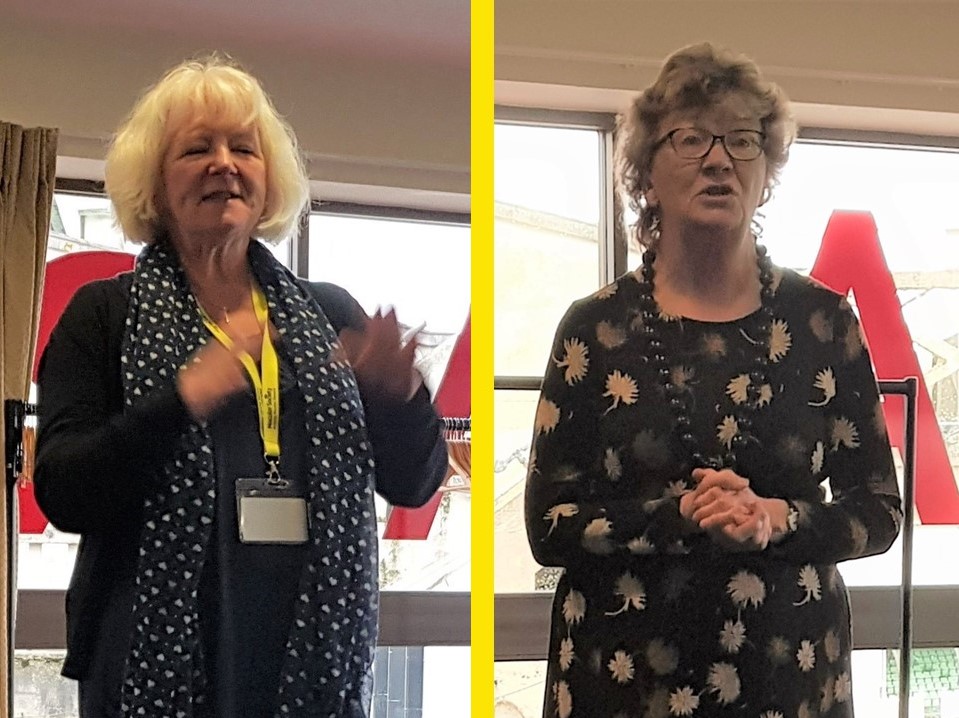
“Macular degeneration,” Stella told us, “is the biggest reason for sight loss in the country now”. It was a statement that certainly grabbed our attention.
The macula is a small area near the centre of the retina (the retina being a thin layer of cells that lines the back of our eyeballs). The macula deals with central, fine detailed vision – which is why patients with macular degeneration may find they have difficulty reading or recognizing faces.
Stella told us that there are two types of macular degeneration, both age related: “wet” (which is less common) and “dry” (which is more common).
In dry macular degeneration the macula cells have started to die and are not being replaced. People may not realize they have the condition as one eye may make up for a problem in the other; moreover, the degenerative process can be slow and go on for a long time so that its effects aren’t easily noticed. This is why it’s important to visit opticians regularly. Although there is no treatment at present, everyone’s eyesight deteriorates at different speeds.
In cases of wet macular degeneration there has been a bleed at the back of the eye and the development of new, leaky blood vessels. Stella told us that it’s important that patients with sudden changes in eyesight seek medical help straightaway, as injections can be given into the eye to prevent vessels forming and leaking.
Stella addressed why people get macular degeneration, and touched on how to help prevent it. Risk factors include aging, smoking, and having high blood pressure (which is why it’s important to stop smoking and keep an eye on blood pressure).
Diet is an important part of prevention. For instance, certain foods such as yellow peppers, kale, and spinach, can help protect the eye. Sun protection can also help prevent damage to the retina – which means wearing quality sunglasses in bright conditions, not just in the summer when the sun is out.
The Macular Society is a national society that provides advice and support to those with macular disease, It has an advice and information line and can provide telephone counselling. It also has “befrienders”, who can help those who’ve become isolated as a result of being unable to drive. The Society also puts money into research, with the money coming via membership, funding and legacies. Stella tells us they have a new ambition: “we’re aiming big,” she says, “we want to beat macular degeneration”. She told us how the magazine their membership receive provides information on latest research and breakthroughs (e.g. stem cell research, which is something the Society has helped support).
As well as the above, the Society has a number of support groups across the country. Through these, people can meet others who understand their condition in a friendly, supportive atmosphere. Often, the support group can help where friends and family can’t. “The support groups,” Stella said,” are fantastic!”
Stella then handed over to Cherryl Abell, who runs the Canterbury support group. The group is very friendly with around 20-40 members with varying degrees of eyesight loss, some wet, some dry. Cherryl herself has macular degeneration and understands what others may be dealing with. The group meets once a month at St Peter’s Methodist Church Hall in St Peter’s Street, Canterbury. At meetings, members get a chance to meet others in their situation over a cup of tea and cake, and enjoy visiting speakers giving talks on a variety of topics – all for a small fee. They may also learn about various gadgets (e.g. magnifiers and lighting) and get tips or learn about art or reading groups and about schemes that may help them*.
The talk was brought to an end with a vote of thanks from Rotarian and Paul Harris Fellow Marjorie Lyle – who told us that she’s had macular degeneration for over 10 years. She said that the meetings were, indeed, very helpful.
To learn more about the Macular Society and find out how to contact the local support group, click here.
*Schemes mentioned included:
- The Hidden Disabilities Sunflower Lanyard Scheme®, which you can read about here; here you can read about Marks & Spencer’s involvement.
- The Canterbury & District Recorder (talking newspaper service), which you can read about here. You can read about our past support for this project here.
Picture: Stella (L) and Cherryl (R) during their presentations. Picture credit: Rotary Club of Canterbury.


